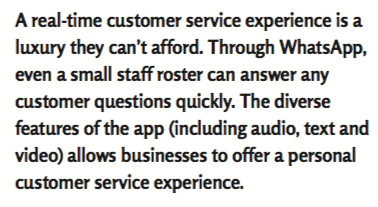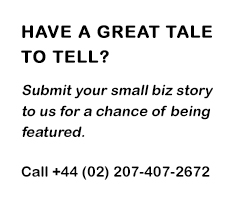In February 2014 Facebook purchased WhatsApp in a deal worth a staggering $19 billion (£11.4bn). WhatsApp is currently the most globally diverse messaging service, with more than 600 million monthly active users from Europe to South America, North America to Asia – the potential benefits for businesses are phenomenal.
Social media networks and messaging apps have revolutionalised the way people communicate, and for businesses it has brought a new way of reaching their audience. Since its acquisition of WhatsApp, Facebook has introduced regular status updates, allowing it to be used for more than just internal communications for business, but also for interacting with consumers.
How SME’s Can Utilise WhatsApp
Real-time Customer Service
For most SME’s, a real-time customer service experience is a luxury they can’t afford. Through WhatsApp, even a small staff roster can answer any customer questions quickly. The diverse features of the app (including audio, text and video) allows businesses to offer a personal customer service experience.
Feedback
WhatsApp messages have an open rate of 70%, making it a precious platform to acquire customer feedback. SME’s can use the app to create questions for a group that will provide answers that are relevant to their business and enable them to implement any necessary changes. This is valuable market research, and best of all – it’s 100% free.
Share Promotional Codes, Flash Sales
The new ‘Status’ feature means businesses can create unique promotional codes for customers to share and redeem. Using the instant photo and location feature, Status can let everyone in the group know about the promotions that a business is running.
Personal Touch
As a WhatsApp group grows, businesses can personalise the interaction with customers via one-on-one communication, allowing businesses to have a direct relationship, where customers can message if they need a particular product, have a question or need support.
WhatsApp can be accessed across various platforms including; smartphone, tablet or PC, so businesses can talk to customers anytime they choose. It has developed into a truly dominating messaging service that looks set to thrive under Facebook’s stewardship.
BrandMag
In February 2014 Facebook purchased WhatsApp in a deal worth a staggering $19 billion (£11.4bn). WhatsApp is currently the most globally diverse messaging service, with more than 600 million monthly active users from Europe to South America, North America to Asia – the potential benefits for businesses are phenomenal.
Social media networks and messaging apps have revolutionalised the way people communicate, and for businesses, it has brought a new way of reaching their audience. Since its acquisition of WhatsApp, Facebook has introduced regular status updates, allowing it to be used for more than just internal communications for business, but also for interacting with consumers.
How SME’s Can Utilise WhatsApp
Feedback
WhatsApp messages have an open rate of 70%, making it a precious platform to acquire customer feedback. SME’s can use the app to create questions for a group that will provide answers that are relevant to their business and enable them to implement any necessary changes. This is valuable market research, and best of all – it’s 100% free.
Personal Touch
As a WhatsApp group grows, businesses can personalise the interaction with customers via one-on-one communication, allowing businesses to have a direct relationship, where customers can message if they need a particular product, have a question or need support.
WhatsApp can be accessed across various platforms including; smartphone, tablet or PC, so businesses can talk to customers anytime they choose. It has developed into a truly dominating messaging service that looks set to thrive under Facebook’s stewardship.



